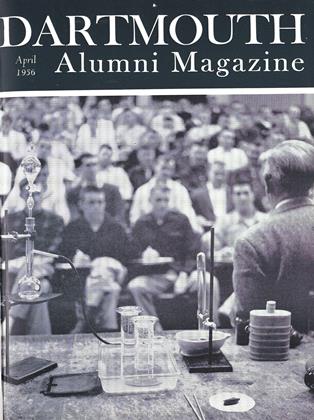FOLLOWING successful completion of the study of "Broadening the Base of Stock Ownership," the Dartmouth Economic Research Council has begun its second year of activity. The topic of the new research program is "Investing Institutional Funds - Channeling People's Savings into Corporate Ownership."
As reported earlier, the Dartmouth Council is composed of alumni from New York City, other New York businessmen, and members of the Tuck School faculty, who are investigating topics of current interest to economists and businessmen, under the sponsorship of the Committee for Economic Development. Publication of last year's study is now under way, and copies will be available in the near future.
The new project is expected to make an extremely worthwhile contribution to the nation's economy and business community. The growth of the large financial institution has been phenomenal. However, there has been no comprehensive effort to measure with any degree of exactness just how large that growth has been. Further, it has been assumed that the character of assets held by these institutions has been changing and that a decided shift into common stock investments has taken place. "Investing Institutional Funds" will attempt to provide accurate data relative to each of these factors. Additionally, it will attempt to analyze the economic effects of the changes which have occurred.
Not only does the Dartmouth Economic Research Council offer the opportunity for research and for the College and its alumni to develop close associations, but all participants are given the chance to serve the business community of which they are a part.
The study will include data about the following types of institutional investors: company and union-administered pension funds, charitable foundations, savings banks, profit-sharing plans, insurance companies, investment companies, and college endowment funds. The initial phase of the investigation will be concerned with the compilation of data relative to the growth of the individual funds since 1944; the investment of such funds, particularly its investment in common stocks, with emphasis on shifts in investment policy that are apparent; and comparisons of the portkolios within tlie specikc groups and anions the major types of institutional investors.
The later phase of the study will be directed toward two main types:
(1) The attitudes and knowledge of employees and other beneficiaries about the reinvestment of their savings. For example, what is the effect of "indirect ownership" of common stocks on employee interest in and attitude toward the free enterprise system?
(2) The implications of the channeling of people's savings into corporate ownership through institutional funds. For example, what is the effect on corporate dividend policy? What are the fiscal effects during depression and boom?
Again this year, the group is organized into three components: (1) The BusinessAdvisory Committee, which plans the research project and serves in an advisory capacity to the other committees; (2) TheBusiness Executives Research Committee, which, in conjunction with the Advisory Committee, performs the necessary research and writes the final report; (3) TheCollege Advisory Committee, consisting of staff members of the Tuck School. From this group is selected the project coordinator who serves in an advisory capacity and makes available to the Research Committee the resources available at Dartmouth. Members of the three units are:
BUSINESS ADVISORY EXECUTIVE COMMITTEE: C. F. McGoughran '20, chairman; H. R, Campbell '21, J. H. Hathaway '48, A. E. Allen '32, C. E. Brundage '16, G. T. Conklin Jr. '36, C. W. DeMond '19, Sumner Emerson '17, J. C. Felli '20, A. F. Flouton '36, B. V. Brooks Jr. '47, G. H. Chamberlaine '21, O. H. Hicks '21, K. W. Fraser '31, C. Kellogg '28, S. S. Larmon '14, R. L. Loeb '21, Kirt Meyer '30, C. E. Newton '20, and H. W. Wilson '18.
BUSINESS EXECUTIVES RESEARCH COMMITTEE: R. A. Allen '46, A. Bullock '46, R. R. Carruthers '4.2, D. E. Cummings T'47, H. Ettinger '48, R. E. Field '43, R. P. Fisher '45, R. Malkin '52, T. J. Mullen '49, E. M. O'Brien T'50, R. C. Rooke '49, E. J. Rosenwald Jr. '52, and G. Spurr T'50.
COLLEGE ADVISORY COMMITTEE: Prof. J. P. Logan, chairman; Prof. T. A. Andersen, Prof. H. E. Angelo, and Dean A. R. Upgren.
The research committee is subdivided into four groups of from six to seven members. Each of the sub-groups will study the activities of two or three of the large institutional investors. Among the chairmen of these sub-groups are Donald E. Cummings T'47, Robert E. Field T'47, and Robert C. Rooke T'50. These men are responsible for directing the sub-groups in all phases of the project including the collection and interpretation of data and the preparation of the initial draft of the final written report.
 View Full Issue
View Full Issue
More From This Issue
-
 Feature
FeatureThe Hopkins Center Concept
April 1956 -
 Feature
FeatureTHE MOCK-DUEL MURDER
April 1956 By EDWARD CONNERY LATHEM '51 -
 Feature
FeatureELECTION-YEAR CONFERENCE
April 1956 By ROBERT H. GILE '56 -
 Feature
FeatureA Tuckerman Tradition
April 1956 By ROBERT S. MONAHAN '29 -
 Class Notes
Class Notes1918
April 1956 By ERNEST H. EARLEY, RICHARD A. HOLTON -
 Class Notes
Class Notes1929
April 1956 By CHRISTIAN E. BORN, JOHN W. MOXON
Article
-
 Article
ArticleA WAH-HOO-WAH!
December 1937 -
 Article
ArticleThe Hanover Scene
July 1953 By BILL McCARTER '19 -
 Article
ArticleMonster Hunter
January 1977 By E.A.C. -
 Article
ArticleFRATERNITY RULES CHANGED
May 1938 By Ralph N. Hill '39 -
 Article
ArticleGRADUS AD PARNASSUM
July 1940 By The Editor -
 Article
ArticlePublication Schedule
May 1942 By The Editor

